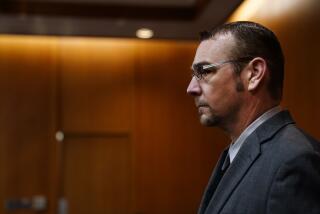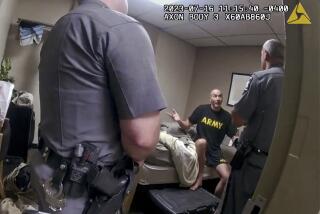James Holmes disclosed homicidal thoughts but not a plan, psychiatrist says
Dr. Lynne Fenton, the psychiatrist who treated James E. Holmes longer than any other mental health professional, was supposed to shed light into the far reaches of the mass shooter’s brain in testimony expected to prove key to the lengthy trial.
Instead, she seemed as cautious as her tight-lipped former patient, whom she described on the witness stand Tuesday as “contemptuous, devaluing, evasive, guarded, hostile, suspicious and uncooperative.”
Fenton headed the student mental health services at the University of Colorado’s Anschutz Medical Campus, where Holmes, now 27, was pursuing a graduate degree in neuroscience.
Holmes was seen by mental health professionals at the center eight times in 2012 between March 16, when he first walked in, and June 11, when he cut off therapy just weeks before strapping on protective gear, slinging an AR-15 across his chest and blasting his way through a suburban Denver movie theater.
From his first appointment with a social worker and continuing throughout his therapy, Holmes said he was fixated on killing people. Although he was stockpiling weapons, ammunition and gear the entire time he was being treated, Fenton said he never once talked about a plan for carrying through on his desires.
“Had the defendant told you that he’d been purchasing weapons, chosen the theater, bought handcuffs, would you have made a different decision” about his treatment? Arapahoe County Dist. Atty. George H. Brauchler asked Fenton.
“I would have had information that he didn’t just have homicidal thoughts, but that he had a plan and intent to carry out those thoughts,” Fenton said. “I likely would have put him on a mental health hold and contacted the police.”
“But he never told you anything?” Brauchler asked.
“No,” Fenton responded.
On July 20, 2012, at a midnight showing of “The Dark Knight Rises,” Holmes killed 12 people and wounded 70 others in one of the worst mass shootings in American history.
Margaret Roth was the social worker who evaluated Holmes and referred him to Fenton for therapy. On Tuesday, the psychiatrist said Roth described the shooter as “one of the most anxious people she ever had seen.”
“She thought he had obsessive-compulsive disorder,” Fenton testified. “He had thoughts of killing people. But she didn’t think he was imminently dangerous.”
Fenton, who repeatedly referenced her case notes while testifying, said Holmes was seeking help for what he described as anxiety around other people. He had recently broken up with his first serious girlfriend, she said, and he told her that he had relationship problems.
“He said, and I am going to read this, because I have a quote, ‘I don’t have relationships with people. They have relationships with me,’” Fenton recounted. “I asked him a lot about his background. He described how, when he was 10, he got glasses, and, after that, he wanted to overcome his biology.”
In response to questions from Brauchler, Fenton painted a picture of a secretive, tightly wound young man whose “thinking was rather off.”
“I suspected he might have a personality disorder,” she said, something along the lines of a “schizoid or schizotypal” disorder, and that he would benefit from antipsychotic drugs.
She said he never talked about the system of “human capital” that he discussed during 22 hours of recorded interviews with a court-ordered psychiatrist after he pleaded not guilty by reason of insanity to the Aurora, Colo., rampage.
During those interviews, which were played for the jury, Holmes described this system as a means of making himself feel better by killing: “I just designated arbitrary value of like one to each person. One value unit.... As a human being they have this value, and I take that value.... I increased my self-worth, and I didn’t have to die.”
When Fenton pressed Holmes about the homicidal thoughts that led him to seek help, he talked about how breaking up with his girlfriend caused an increase in his “obsessive thoughts about women,” she said. “He added further that he had three categories about obsessive thoughts, one that had to do with women, one with men, one with everyone.
“I tried to get more information,” she said, “but he would not give more details.”
She did, however, say that those obsessive thoughts were all about killing.
Brauchler, who must prove that Holmes was sane at the time of the shooting, pressed Fenton repeatedly about her patient’s demeanor. The prosecutor asked whether, at each appointment, Holmes was neatly dressed, punctual, comported himself well, never had an outburst. He asked whether the defendant answered emails, spelled well, managed his affairs.
“Yes” was Fenton’s monosyllabic reply.
Fenton and the university have been sued in civil court for not placing Holmes on a psychiatric hold and preventing the massacre.
While cross-examining Fenton on Tuesday, defense attorney Tamara Brady emphasized that Holmes was consistent in telling mental health providers that he had homicidal fantasies and they only increased over time.
She also worked to convince the jury that neatness and insanity are not mutually exclusive.
Brady: “You didn’t tell his mom he was having thoughts of killing people three to four times a day?”
Fenton: “No.”
Brady: “Does mental illness preclude someone from being frugal?”
Fenton: “Not necessarily.”
Brady: “Does it preclude someone from answering email?”
Fenton: “Not necessarily.”
Brady: “Does it preclude someone from spelling correctly?”
Fenton: “Not necessarily.”
Brady: “Can smart people be mentally ill?
Fenton: “Yes.”
More to Read
Start your day right
Sign up for Essential California for news, features and recommendations from the L.A. Times and beyond in your inbox six days a week.
You may occasionally receive promotional content from the Los Angeles Times.







